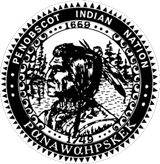Air Quality
The air program at one time built up capacity for three positions: Program Manager, Data Analyst, and field technician. The program experienced continuous budget cuts and the staff was gradually reduced to a single person. This position became part-time two years ago. In spite of this, the program has continued to expand in number of monitoring and sampling equipment, as well as the services to Penobscot Citizens that the program manager continues to provide, and his contribution to the efforts of national workgroups for the benefit of all Tribes.
The mission of the Air Quality Program is to protect and improve the quality of the Penobscot Nation’s air shed and the health of its Citizens.
Indoor Air Quality
It’s estimated that folks spend 80-90% of our time indoors. That fact alone gives cause for us to be aware of our opportunities to improve our health by caring for our IAQ. The federal government will not force regulations on our personal living space, but it can and does regulate the products that we use in them and to construct them. The rest is up to us to do, being conscientious consumers and diligent dwellers. It’s a good idea, at the very least, to change the air in your house every three days. But here are some areas where the Tribe’s Air Program helps our Citizens.
Mold
US EPA has determined that there are way too many different types of mold to quantify which ones are unhealthy to breathe their spores, versus which ones are not. Instead, it is proper to follow a zero-policy rule. Moisture is the key word here. Stop the moisture to stop the spread of mold. Clean mold with a dilution of bleach and white vinegar. Never mix ammonia with bleach, for that will release a deadly gas. The Air Program has stopped performing tests for mold since it is easy to tell if you have it or not, due to its odor. Here are some links for how to deal with mold. If you need assistance, please feel free to call the Program Manager at (207)817-7340 and leave a message.
Radon
The second leading cause of lung cancer in the United States is a colorless, odorless gas that seeps into the basement of a house from the ground. A mobile home will generally be safe from this due to the nature of the skirting and air movement through it.
Dust
Outdoor Air Quality
- Ground Level Ozone
- Dust
- Factory Pollution
- Acid Rain
- Mercury Deposition
- Regional Haze
- Burning Leaves
National Workgroups
NTAA
The Air Program Manager has been the chairman of the NTAA since 2009. http://www.ntaatribalair.org/ The National Tribal Air Association was founded in 2002 with a grant from the United States Environmental Protection Agency Office of Air and Radiation. The mission of the NTAA is to advance air quality management policies and programs, consistent with the needs, interests, and unique legal status of American Indian Tribes and Alaska Natives. NTAA goals are to:
- Advocate and advance tribal environmental, cultural, and economic interests in the development of air policy at all levels of government (tribal, federal, state, local, and international).
- Promote the development, funding, and capacity building of tribal air management programs.
- Promote and facilitate air quality policy and technical information that may include research and scientific and medical studies.
- Advance the recognition and acceptance of tribal sovereign authority by conducting effective communication and outreach to state, local, federal, and international agencies, and the general public.
- Encourage and support appropriate consultation with all tribal governments in accordance with tribal structures and policies.
Tribal Science Council (TSC)
The Air Program Manager was recently selected to chair the TSC. http://www.epa.gov/osp/tribes/who.htm
The Tribal Science Council (TSC), established in 1999, is a forum for interaction between Tribal and Agency representatives to work collaboratively on environmental science issues. The Council is comprised of EPA representatives from across the Agency, a tribal representative from each of the EPA regions with federally recognized tribes, and a representative of the Alaska Native Villages. The TSC is committed to the development of sound scientific approaches to meet the needs of Tribes.
National Tribal Operations Committee (NTOC)
Regional Haze/ Ozone Transport Commission
TAMS
Climate Change
Climate change isn’t something new. It has never stopped occurring. It is senseless to attempt to place blame or debate the veracity of its existence when we should be expending our energy on adaptation to its unfolding story. Our federal partners are looking over the fences in their backyards, and reaching out to each other with the aim of combining resources, removing unnecessary and wasteful redundancies, and filling gaps. Tribes play a vital role in this due to the nature of Tribal Ecological Knowledge, for we have been on this continent for thousands of years. We flourished through the last ice age, and we will face this new era with the same resiliency that has served us through all of our challenges.
